Key takeaways:
- Cannabis contracts require careful attention to specific terms, such as compliance regulations and intellectual property rights, to avoid disputes.
- Flexibility in contracts is essential due to the constantly changing legal landscape surrounding cannabis, allowing parties to adapt to new regulations.
- Clarity in defining roles, compliance with local laws, and transparent pricing are crucial components for successful cannabis contracts.
- Personalizing agreements and developing strong relationships can enhance partnerships, reflecting shared values and goals in the cannabis industry.
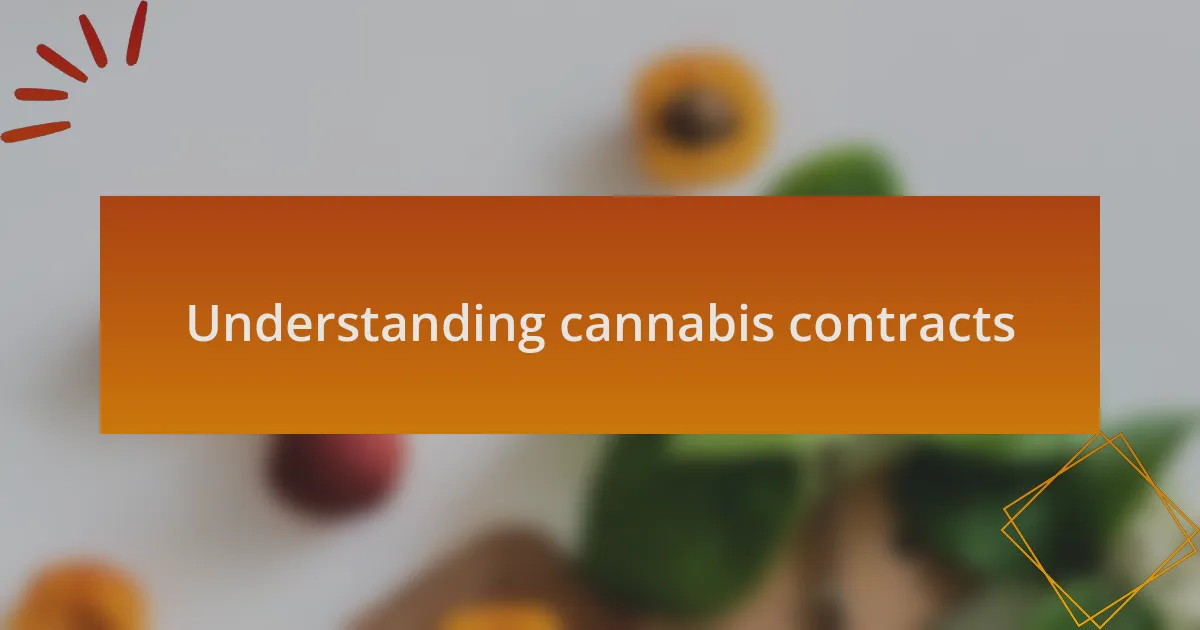
Understanding cannabis contracts
When diving into cannabis contracts, it’s essential to grasp the nuances that differentiate them from typical business agreements. I remember the first time I reviewed a cannabis supply contract; I felt overwhelmed by the specific terms like “cultivation quotas” and “compliance regulations.” It struck me how crucial it was to pay attention to these details, as they directly impacted the partnership’s success.
There’s often a misconception that these contracts only cover basic responsibilities, but they delve much deeper. For instance, I once encountered a clause regarding intellectual property rights. It was a real eye-opener! Understanding who owns the recipe for an edible can change the dynamics of a partnership, and failing to address these nuances can lead to disputes that are tough to resolve.
Have you ever considered the implications of changing regulations on these contracts? From state laws to federal guidelines, the landscape is constantly shifting. I recall a situation where a supplier had to renegotiate a contract due to new compliance mandates. It highlighted how vital it is to have flexibility built into the contract terms, ensuring that both parties can adapt as the industry evolves. This adaptability can make all the difference in a rapidly changing market.
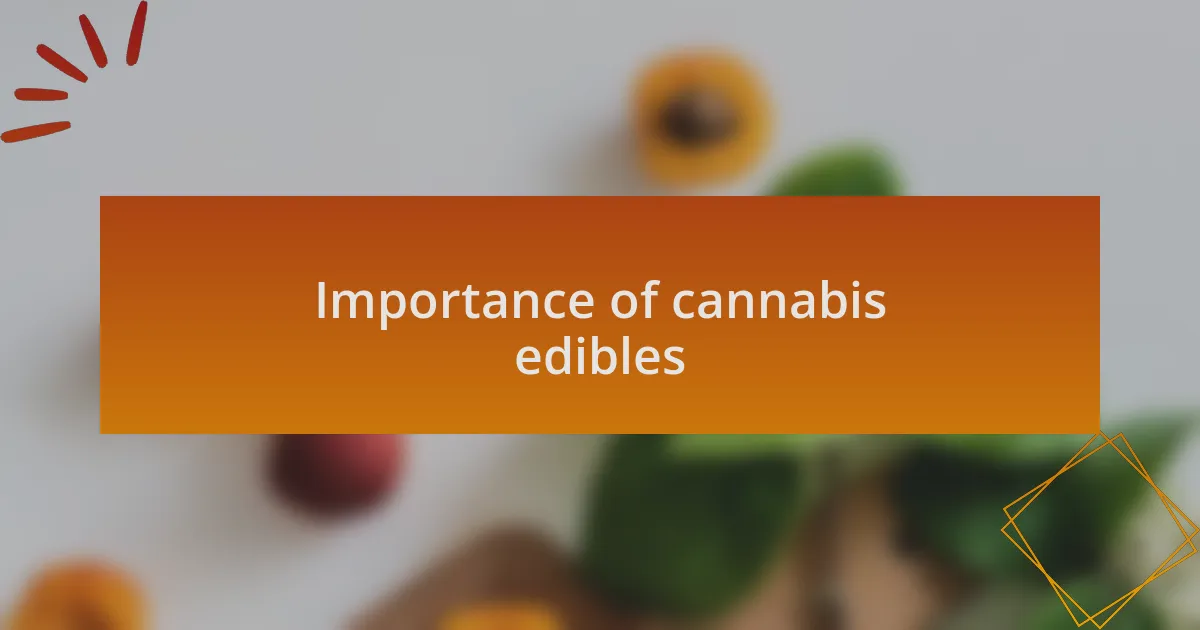
Importance of cannabis edibles
The significance of cannabis edibles cannot be overstated. I remember attending an event where I sampled various edibles, and it became clear how these products can cater to a wide range of preferences and needs. From gummies to infused chocolates, they offer a discreet and enjoyable way to experience cannabis without smoking, making them appealing for both new users and seasoned enthusiasts.
Moreover, edibles provide a unique opportunity for precise dosing. I often hear people express concerns about the unpredictability of smoking cannabis, but with edibles, you can control your intake much better. I once shared a chocolate bar with a friend who was nervous about trying cannabis. She was blown away by how effectively she could manage her experience. The ability to start low and go slow is fundamental for fostering a safe and enjoyable introduction to cannabis.
Finally, let’s not overlook the cultural impact of cannabis edibles. The creativity behind them often leads to culinary experimentation, which I find particularly exciting. I once collaborated with a local chef to create a batch of infused brownies, and the process revealed how edibles can bridge the gap between gourmet cuisine and cannabis culture. Have you ever thought about how these products can change perceptions and encourage more people to embrace cannabis? Through innovative recipes and flavors, edibles can illuminate the diverse possibilities within the cannabis space, inviting everyone to explore its potential.

Types of cannabis edibles
When it comes to types of cannabis edibles, the variety is truly remarkable. I’ve encountered everything from delightful fruit-flavored gummies to savory infused snacks like popcorn. Each type caters to distinct tastes and experiences, and it’s fascinating to see how some choices are particularly appealing to those just starting their cannabis journey while others are crafted for seasoned consumers who seek more intricate flavors.
I’ve also had memorable moments exploring infused beverages—think cannabis-infused teas and sodas. The first time I sipped on a sparkling cannabis drink at a friend’s gathering, I was amazed at how refreshing and enjoyable it was. It made me wonder: could beverages be the next big trend in the edibles market? It’s clear there’s a growing interest in finding new ways to consume cannabis that align with traditional social settings.
Furthermore, baked goods have carved out a special niche in the realm of edibles. I remember a weekend baking session where I experimented with cannabis-infused cookies. The aroma in my kitchen was heavenly, and sharing them with friends while discussing our experiences with cannabis really deepened our connections. Don’t you find it’s often the shared moments that elevate the enjoyment of edibles? Baked goods, with their nostalgic charm, not only deliver the effects but also foster a sense of community among consumers.
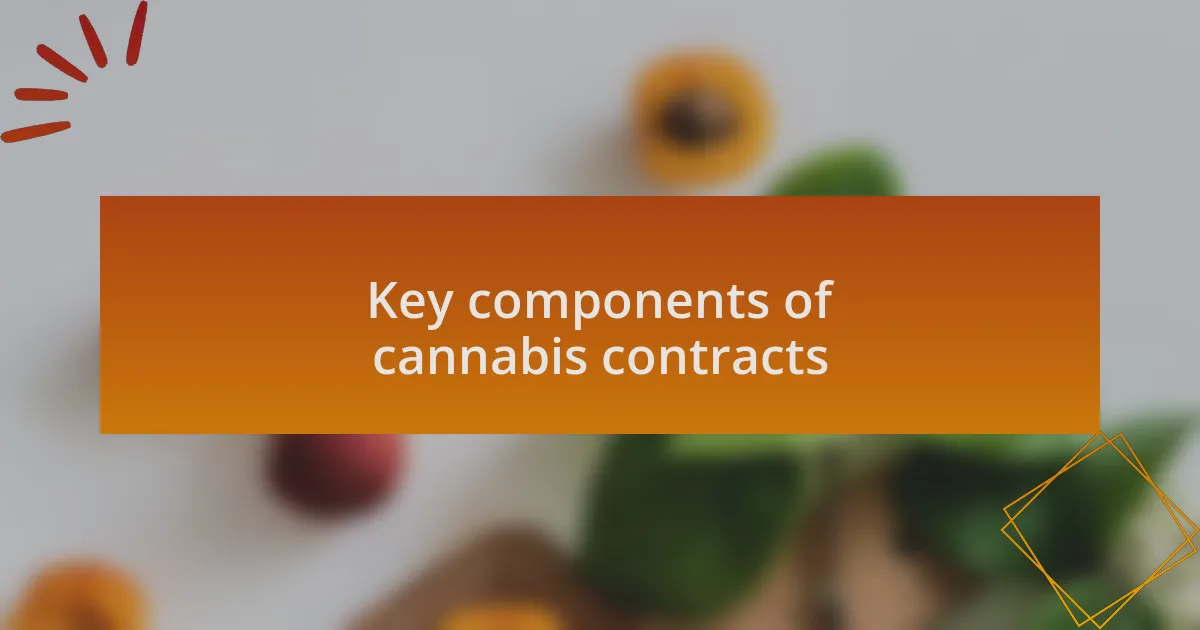
Key components of cannabis contracts
When I think about the key components of cannabis contracts, clarity stands out as vital. A well-drafted contract should clearly outline the roles and responsibilities of each party involved. During a recent collaboration, I experienced firsthand how a lack of specificity led to misunderstandings about product distribution. It made me realize how essential it is to detail every aspect, from delivery schedules to quality standards.
Another important element is compliance with local laws and regulations. Given how cannabis laws can vary dramatically from one region to another, I always ensure that every contract reflects these nuances. For example, a friend of mine faced significant hurdles with her edibles business because her contracts didn’t fully address the legalities of product testing. This kind of oversight can lead to costly setbacks and even legal troubles.
Finally, I believe pricing and payment terms must be transparent and straightforward. I remember negotiating with a supplier who tried to obscure the pricing structure. It was frustrating, and it made me appreciate the importance of clearly defined financial terms. After all, a successful partnership hinges on trust, and having those details clearly laid out helps build that trust. How can we foster stronger relationships if we’re unsure about how much we need to pay or when the payments are due?
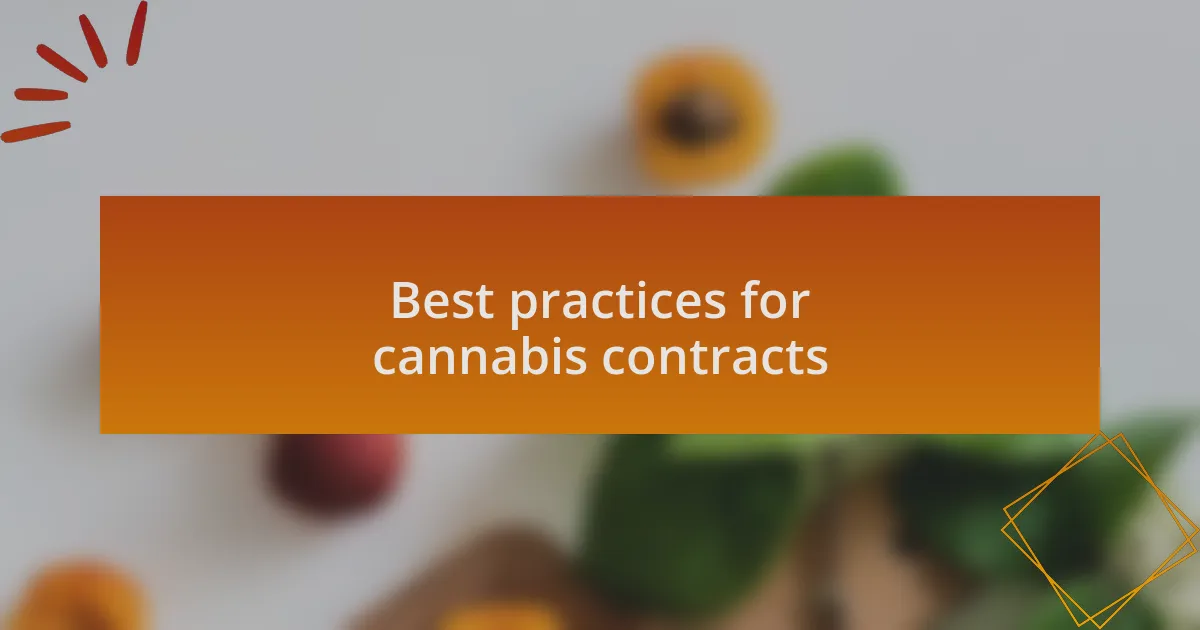
Best practices for cannabis contracts
When it comes to best practices for cannabis contracts, I’ve learned the hard way that attention to detail is non-negotiable. I once overlooked the fine print in a supplier agreement, assuming everything was straightforward. That oversight cost me not just money but also valuable time. Now, I always advocate for reviewing every clause to ensure that nothing is left to chance. How can we establish a solid foundation if we don’t double-check the terms we’re agreeing to?
Another strong recommendation I have is to incorporate a dispute resolution clause. Things can go sideways in any business relationship, but cannabis contracts can be particularly complex due to the ever-changing legal landscape. I recall a partner dispute that dragged on longer than it should have simply because we hadn’t agreed on how to resolve disagreements. Including clear steps for mediation or arbitration right from the start serves as a safety net, fostering a sense of security for everyone involved. Isn’t it easier to focus on growing the business when you know there’s a plan in place for potential conflicts?
Lastly, I find that personalizing agreements can have a significant positive impact. Instead of relying on generic templates, I take the time to tailor contracts to reflect the specific interests and circumstances of my partners. This approach not only shows that I value our relationship but also helps to align our goals more closely. I remember customizing a partnership agreement that included sustainability commitments, which resonated deeply with my eco-conscious collaborator. Isn’t it fascinating how adding that extra personal touch can strengthen collaborations in the cannabis industry?
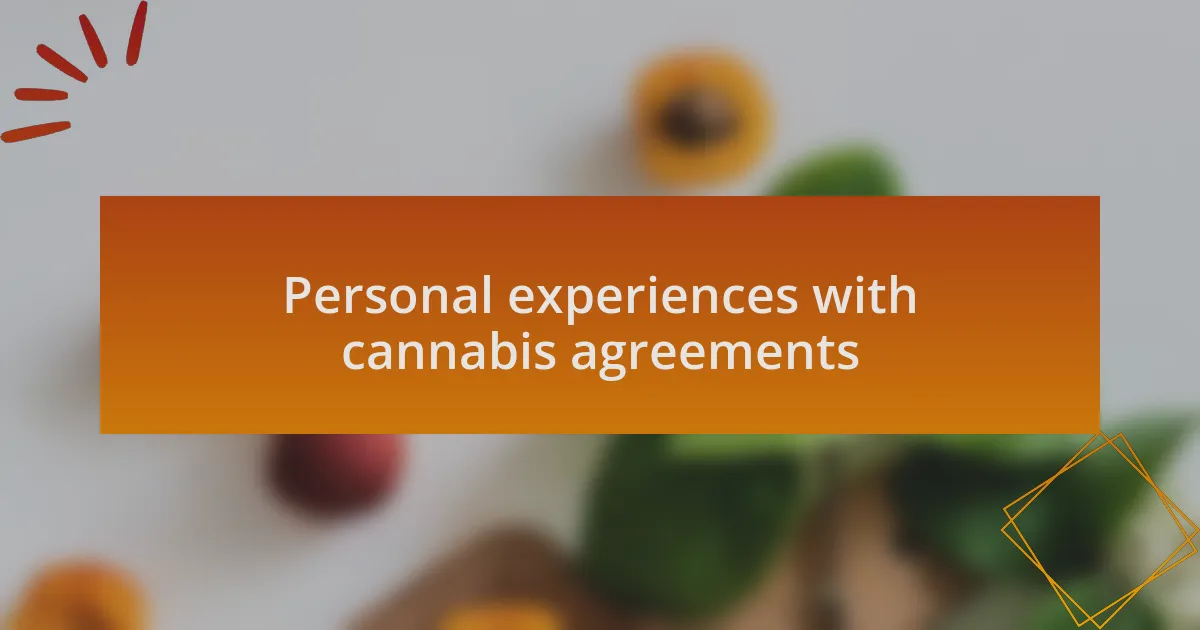
Personal experiences with cannabis agreements
Navigating cannabis agreements has been quite the journey for me. I still recall sitting across the table from a potential distributor, feeling confident but nervous. We discussed the terms, and I got swept up in the excitement, but I didn’t fully gauge how our differing business philosophies could clash after we signed. It taught me the importance of not just focusing on the contract’s legality but on alignment in business values.
There was a time when I forged a partnership with a fellow entrepreneur who had a passion for innovation. We meticulously detailed our roles in the agreement, yet I failed to clarify our expectations around product launches. It led to misunderstandings and frustration along the way, which ultimately strained our relationship. Reflecting on that, I now emphasize the importance of being crystal clear about mutual goals from the outset—how can we collaborate effectively if we aren’t on the same page?
One memorable experience involved drafting a contract with a farmer who was just starting in cannabis cultivation. He was passionate but lacked experience in negotiations. Taking the time to explain each clause and its implications helped him gain confidence in the process. It was rewarding to see how the contract, once a daunting document, transformed into a mutual roadmap. After all, isn’t the essence of these agreements about building trust and reinforcing partnerships in an industry that often feels uncertain?
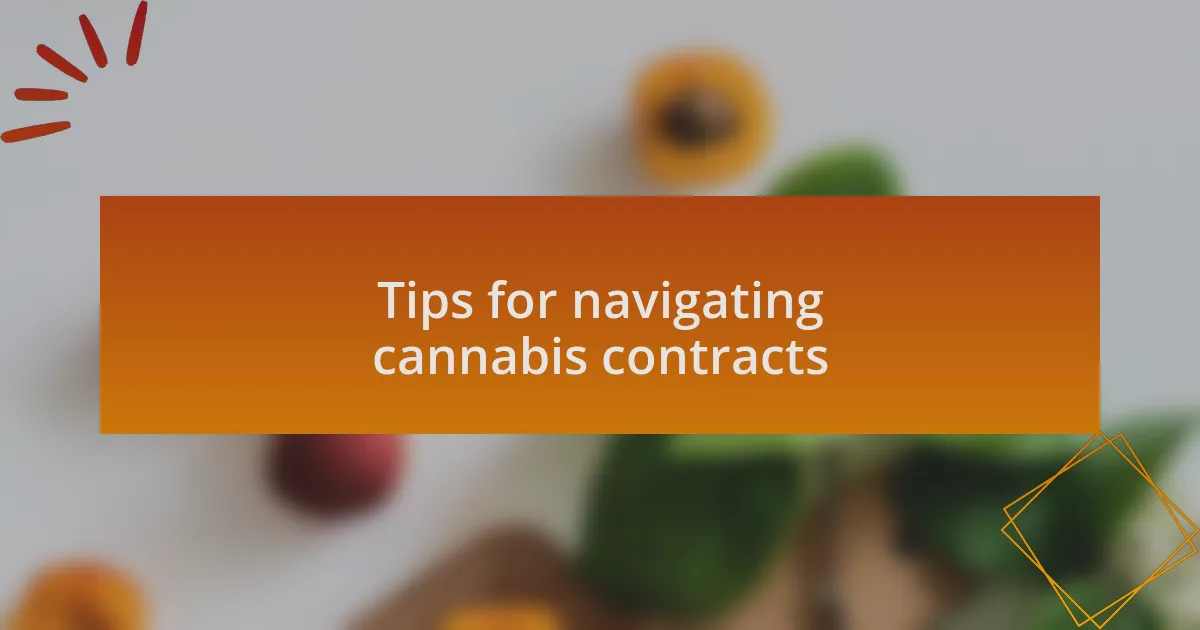
Tips for navigating cannabis contracts
When reviewing a cannabis contract, take the time to highlight any ambiguous language that could lead to misunderstandings. I remember a moment when I skimmed through a deal and missed a clause that seemed straightforward but had significant implications down the line. It’s easy to get caught up in the excitement, but truly parsing through the language can save a lot of headaches later. Why rush when clarity can ensure smoother operations?
Building relationships with legal experts in the cannabis industry has been invaluable for me. I once consulted an attorney after experiencing the fallout from a poorly constructed agreement, and their insights transformed my contracts moving forward. Their guidance helped me understand the critical importance of not only what is written in the contract but also the intent behind it. Connecting with someone who knows the intricacies of cannabis law can empower you to craft agreements that effectively protect your interests.
Don’t shy away from renegotiating terms if something feels off, even after the contract has been signed. I once found myself in a situation where the market dynamics changed, affecting our original agreement. Approaching my partner to discuss a revision felt daunting, but it ultimately strengthened our collaboration. How often do we let discomfort linger instead of addressing it upfront? Engaging in open conversations about adjustments is key to maintaining healthy partnerships in this ever-evolving industry.